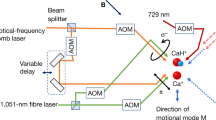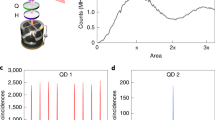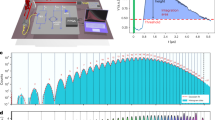Abstract
If a photon of definite polarization encounters an excited atom, there is typically some nonvanishing probability that the atom will emit a second photon by stimulated emission. Such a photon is guaranteed to have the same polarization as the original photon. But is it possible by this or any other process to amplify a quantum state, that is, to produce several copies of a quantum system (the polarized photon in the present case) each having the same state as the original? If it were, the amplifying process could be used to ascertain the exact state of a quantum system: in the case of a photon, one could determine its polarization by first producing a beam of identically polarized copies and then measuring the Stokes parameters1. We show here that the linearity of quantum mechanics forbids such replication and that this conclusion holds for all quantum systems.
This is a preview of subscription content, access via your institution
Access options
Subscribe to this journal
Receive 51 print issues and online access
$199.00 per year
only $3.90 per issue
Buy this article
- Purchase on Springer Link
- Instant access to full article PDF
Prices may be subject to local taxes which are calculated during checkout
Similar content being viewed by others
References
Born, M. & Wolf, E. Principles of Optics 4th edn (Pergamon, New York, 1970).
Herbert, N. Found. Phys. (in the press).
Einstein, A., Podolsky, B. & Rosen, N. Phys. Rev. 47, 777–780 (1935).
Bohm, D. Quantum Theory, 611–623 (Prentice-Hall, Englewood Cliffs, 1951).
Kocher, C. A. & Commins, E. D. Phys. Rev. Lett. 18, 575–578 (1967).
Freedman, S. J. & Clauser, J. R. Phys. Rev. Lett. 28, 938–941 (1972).
Fry, E. S. & Thompson, R. C. Phys. Rev. Lett. 37, 465–468 (1976).
Aspect, A., Grangier, P. & Roger, G. Phys. Rev. Lett. 47, 460–463 (1981).
Bussey, P. J. Phys. Lett. 90 A, 9–12 (1982).
Haus, H. A. & Mullen, J. A. Phys. Rev. 128, 2407–2410 (1962).
Caves, C. M. Phys. Rev. D15, (in the press).
Gozzini, A. Proc. Symp. on Wave–Particle Dualism (eds Diner, S., Fargue, D., Lochak, G. & Selleri, F) (Reidel, Dordrecht, in the press).
Author information
Authors and Affiliations
Rights and permissions
About this article
Cite this article
Wootters, W., Zurek, W. A single quantum cannot be cloned. Nature 299, 802–803 (1982). https://doi.org/10.1038/299802a0
Received:
Accepted:
Issue Date:
DOI: https://doi.org/10.1038/299802a0
This article is cited by
-
Multi-type-output Assisted Cloning of Unknown Single-qubit States
International Journal of Theoretical Physics (2024)
-
Verifiable Quantum Secret Sharing Scheme Based on LDPC Codes
International Journal of Theoretical Physics (2024)
-
A rational hierarchical (t,n)-threshold quantum secret sharing scheme
Quantum Information Processing (2024)
-
MDS, Hermitian almost MDS, and Gilbert–Varshamov quantum codes from generalized monomial-Cartesian codes
Quantum Information Processing (2024)
-
A No-Go Result on Observing Quantum Superpositions
Foundations of Physics (2024)
Comments
By submitting a comment you agree to abide by our Terms and Community Guidelines. If you find something abusive or that does not comply with our terms or guidelines please flag it as inappropriate.



